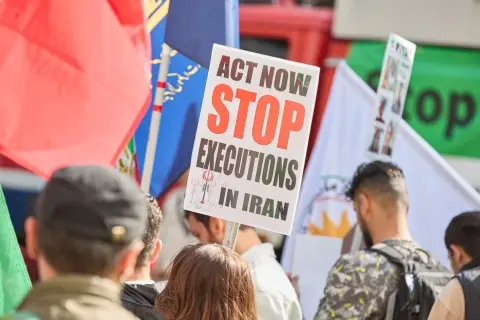Minorities and Political Prisoners Facing Execution after Rampant Due Process Violations

A demonstration on the anniversary of the death in custody of Mahsa Jina Amini with signs calling to stop the executions in Iran, September 14, 2024. © 2024 Georg Wendt/picture alliance via Getty Images
(Beirut) – Iranian authorities have issued a flurry of new death sentences in recent weeks, sentencing political prisoners, ethnic minorities, and foreign nationals to capital punishment, Human Rights Watch said today. Among the latest cases is a Kurdish political prisoner, Warisha Moradi, a member of the Free Women’s Society of Eastern Kurdistan. Iran’s revolutionary court in Tehran sentenced Moradi to death on the charge of “armed rebellion against the state” on November 10, 2024.
The Kurdistan Human Rights Network (KHRN) reported that authorities did not allow Moradi to defend herself, and the presiding judge did not permit her lawyers to present a defense. Security forces arrested Moradi in the city of Sanandaj in Kurdistan province in August 2023. She was later transferred to Evin prison, where she was kept in solidarity confinement for five months and was subjected to pressure and torture. Since May 2024, KHRN reported, the authorities had not allowed her family to visit.
“Iranian authorities use the death penalty as a tool of fear, particularly targeting ethnic minorities and political dissidents after unfair trials,” said Nahid Naghshbandi, acting Iran researcher at Human Rights Watch. “This brutal tactic aims to suppress any opposition to an autocratic government through intimidation.”
The authorities have sentenced to death five other Kurdish men in recent weeks on charges of “espionage for Israel.” The Urmia revolutionary court on November 2 sentenced Naser Bekrzadeh, from Urmia, West Azerbaijan province, to death on these charges, and on November 6, the public relations office of the West Azerbaijan Judiciary announced the death sentences of four prisoners in two separate cases, who were charged with “espionage for Israel and collaboration with Mossad,” the Israeli intelligence agency.
KHRN reported that Islamic Revolutionary Guard Corps security forces arrested Edris Ali and Azad Shojaei, from Sardasht, West Azerbaijan province, and Rasoul Ahmad Rasoul, from Qaladze in the Kurdistan Region of Iraq, in June 2023 in Sardasht. Shahin Vasaf, from Salmas, West Azerbaijan province, was arrested on September 21, 2022.
The Tehran Criminal Court sentenced six defendants in the so-called “Ekbatan case” to death for their alleged roles in killing a member of the Basij paramilitary force during the “Woman, Life, Freedom” protests in 2022. On November 13, Babak Paknia, a lawyer for some of these defendants, announced this sentence and wrote on X that the head of the court branch had issued a dissenting opinion. The sentence is subject to appeal. The six defendants were among 14 people charged with the killing of the Basij member, Arman Aliverdi, in the Ekbatan neighbrhood of Tehran during the protests.
Additionally, four Arab prisoners from Ahvaz, Khuzestan province, are at risk of imminent execution, according to the Karun Human Rights Organization. The organization said that the four had been transferred on October 15 to solitary confinement in Sepidar prison in Ahvaz for the execution of their sentences. They are: Ali Majdam, Moein Khonafri, Mohammadreza Moghadam, and Adnan Gheibshavi (Mousavi).
The Ahvaz revolutionary court had sentenced them along with two others, Habib Deris and Salem Mousavi, to death for their alleged involvement in the killings of two Basij members, a law enforcement officer, and a soldier. The Intelligence Department arrested them in Ahvaz and surrounding cities in 2017 and 2018, Karun Human Rights Organization reported.
The surge in executions extends to Afghan citizens in Iran as well. Human rights groups reported that at least 49 Afghan nationals have been executed in Iran this year, 13 in October alone. According to Iran Human Rights, in the first 10 months of 2024, at least 651 people overall were executed in Iran, including 166 people in October.
“Iran’s revolutionary courts are a tool of systematic repression that violate citizens’ fundamental rights and hand out death sentences indiscriminately, leaving legal protections meaningless,” Naghshbandi said. “The international community should categorically condemn this alarming trend and pressure Iranian authorities to halt these executions.”
Source: Iran: Flurry of New Death Sentences | Human Rights Watch